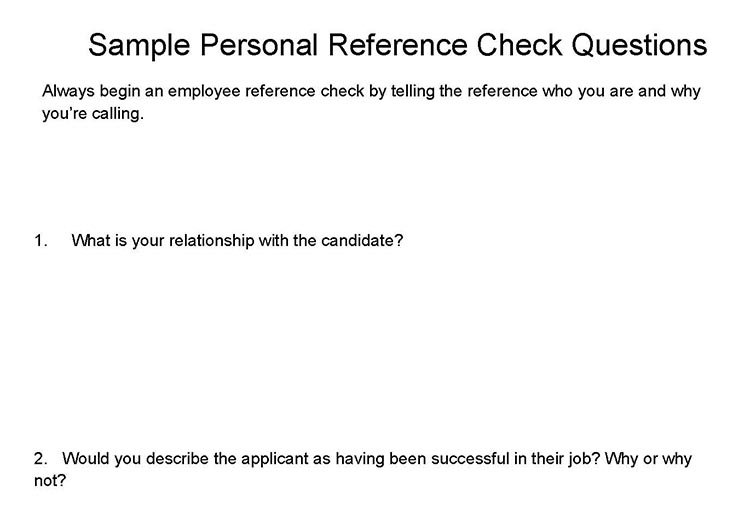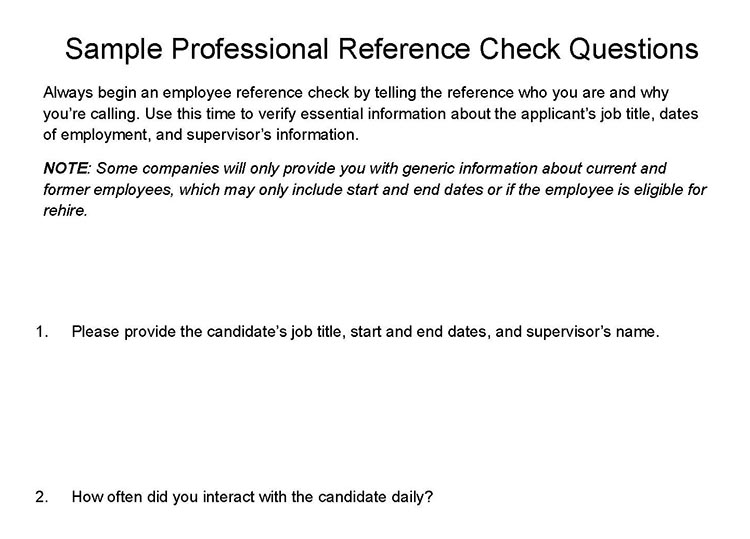An employment reference check refers to calls you make to at least two references (they may be personal or professional) where you ask about the candidate’s qualities, qualifications, and work habits. While most references that an applicant provides are biased in their favor, asking the right questions can help you uncover some red flags or confirm your hiring choice.
This guide covers the types of reference checks, how to conduct them, and legal issues surrounding reference checks, including questions to avoid.
Types of Reference Checks
HR or a hiring manager may perform two types of reference checks during the hiring process: personal and professional. Each presents a different set of questions, and you’ll generally have a more extensive list of questions for professional references.
Personal Reference Checks
This involves contacting a candidate’s personal references, such as a friend or family member. The reference check questions you ask can help you learn about the character of the candidate.
- What is your personal relationship with the candidate?
- Would you describe the candidate as having been successful in their job?
- How does the candidate handle stress and conflict?
Download the employment reference check template below for a guide on questions to ask during a personal reference check.
Professional Reference Checks
This type of check involves getting in touch with a candidate’s professional references, such as a former employer, boss, or coworker. The questions for this type of reference check dive deeper into the job history of the candidate.
- What type of work did the candidate do for your company?
- How were the candidate’s relationships with colleagues and supervisors?
- Was the candidate successful in their role with your company?
For a guide on questions to ask during professional reference checks, download the employment reference check template below.
For more information on the types of questions you should ask during an employment reference check, look into our reference check questions article.
How to Conduct Employment Reference Checks
Reference checks for employment are an important applicant screening step in the hiring process. This might be the only time when you talk to someone other than a candidate about their skill set and work performance. To get the most out of these calls, and to learn more about how to check a reference, follow the steps below.
When to Conduct a Reference Check
It is advised that you wait to call references until the candidate has been moved along in the hiring process and you are considering them for the position. As a best practice, call former supervisory references when you’ve narrowed down the candidate pool to your final two or three. At that point, you’re confident that the applicants could do the job, and speaking with references may help put one candidate at the front of the pack.
It is recommended that you ask for references when scheduling the first interview. Some companies ask for references when the candidate first applies for a job. Doing so can make the reference check process go faster, but asking for references this early in the hiring process may scare some candidates away. They may not want to give reference names out of fear that their current employer will learn they’re looking for a new job.
Legal Issues When Conducting Reference Checks
Many companies do not allow their HR personnel or supervisors to respond to employee reference check questions, and they have this policy to keep them out of legal trouble. If a reference gives honest feedback but cannot objectively prove the truth of their statement, they could be liable for defamation if you choose not to hire the applicant.
That doesn’t mean you should give up, however. You should still verify the information provided by the applicant. Most companies will still give you objective data, such as:
- Dates of employment
- Job title
- Supervisor’s name
It is also recommended that you ask, “Is the employee eligible for rehire?” This can give you important information. A “Yes” tells you the employee left on good terms and did at least good enough work for the company that it would consider rehiring them, whereas a “No” indicates the employee may not have left on good terms or did not perform well at work, which raises red flags.
If a reference does not want to or is prohibited by company policy from answering questions about the employee, you should not take that as an absolute negative. You can ask the candidate for additional references who might provide more insight.
Types of Questions to Avoid
You should also consider the legality of the questions you plan to ask the references. In some jurisdictions, asking about an employee’s salary is illegal—aptly called salary history bans. If you are hiring someone in one of those jurisdictions, you cannot ask previous employers how much they paid the applicant. Learn more about it in our in-depth guide to salary history bans—we even provide a by-state breakdown of where this applies.
All questions must relate to the job, and the same discrimination laws that apply to interview questions apply to employment reference check questions. You also cannot ask references any questions that you cannot ask applicants. These include questions about the candidate’s:
- Age
- Sexual orientation
- Family life (e.g., marital status or number of children)
- Religious affiliation
- Disability
- Race
Learn more about illegal questions to ask in interviews—these are typically also not allowed to be asked in reference checks.
The best way to avoid these questions is to have a standard policy for employee reference checks and your list of questions at the ready. Consistency ensures that you get the necessary information about applicants without putting your company in legal danger.
Bottom Line
Employee reference checks are a vital part of the hiring process. Speak with at least two employment references for each candidate and ask them all the same employee reference check questions so that you can evaluate applicants equally.

